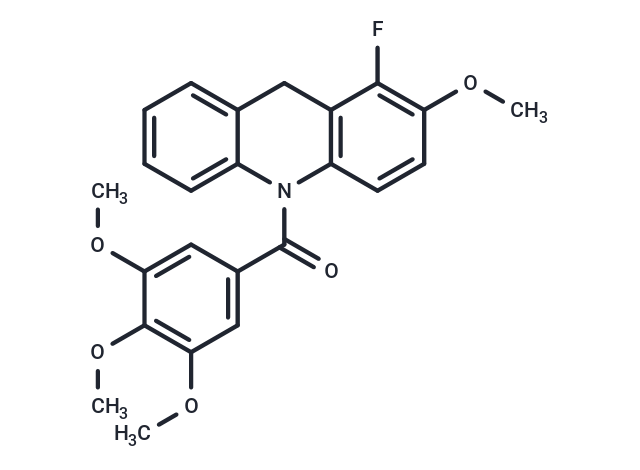Shopping Cart
- Remove All
 Your shopping cart is currently empty
Your shopping cart is currently empty

Tubulin Polymerization-IN-40 is an acridane-based inhibitor that potently disrupts tubulin polymerization, exhibiting an IC50 of 1.5 μM. It halts cancer cell progression at the G2/M phase, triggers apoptosis, and possesses anti-cancer properties along with immunopotentiating effects [1].

| Pack Size | Price | Availability | Quantity |
|---|---|---|---|
| 25 mg | $1,520 | 6-8 weeks | |
| 50 mg | $1,980 | 6-8 weeks | |
| 100 mg | $2,500 | 6-8 weeks |
| Description | Tubulin Polymerization-IN-40 is an acridane-based inhibitor that potently disrupts tubulin polymerization, exhibiting an IC50 of 1.5 μM. It halts cancer cell progression at the G2/M phase, triggers apoptosis, and possesses anti-cancer properties along with immunopotentiating effects [1]. |
| In vitro | Tubulin polymerization-IN-40 (Compound NT-6) exhibited significant antiproliferative efficacy against four cancer cell lines (HCT-116, B16-F10, HeLa, HepG2), with an average IC50 of 30 nM [1]. At concentrations of 10, 25, and 50 nM administered over 48 hours, it effectively induced apoptosis in B16-F10 cells [1]. Furthermore, Tubulin polymerization-IN-40 caused a G2/M phase arrest in B16-F10 cells at the same concentrations after 24 hours [1]. The compound also significantly inhibited colony formation of B16-F10 cells at 50 nM, reducing formation almost completely after 24 hours of treatment [1]. Additionally, Tubulin polymerization-IN-40 dose-dependently inhibited the migration of B16-F10 cells at concentrations of 10, 25, and 50 nM over 24 hours [1]. |
| In vivo | Tubulin polymerization-IN-40 (Compound NT-6; 10 mg/kg; intraperitoneal administration; daily; for 14 days) demonstrated remarkable antitumor efficacy in a melanoma model. When combined with NP-19 (10 mg/kg; intraperitoneal administration), Tubulin polymerization-IN-40 significantly reduced tumor burden (TGI%=77.6%) and enhanced antitumor immune responses [1]. |
| Formula | C24H22FNO5 |
| Cas No. | 2921670-94-0 |
| Storage | Powder: -20°C for 3 years | In solvent: -80°C for 1 year | Shipping with blue ice. |

Copyright © 2015-2025 TargetMol Chemicals Inc. All Rights Reserved.